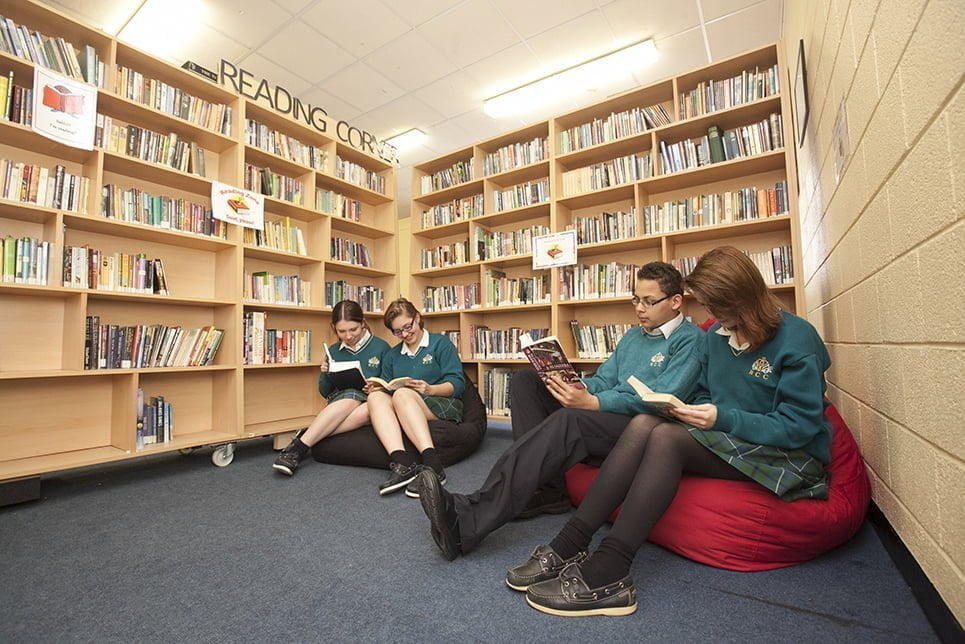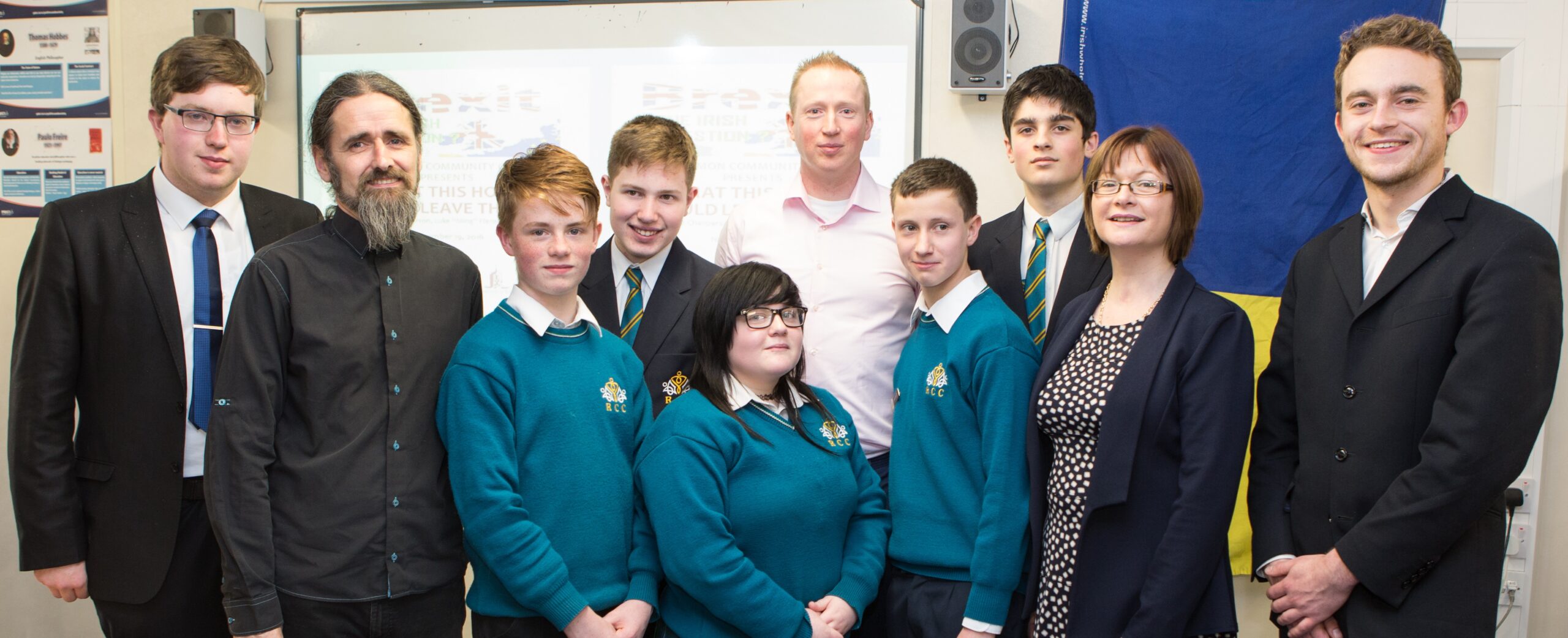English
Language gives students the opportunity to access the understanding, knowledge and skills to promote their personal growth and effective participation in society.
The study of language enables students to build on their learning in primary school and further develop their skills and enjoyment in using it effectively. Through language learning and use, students discover information, develop thinking, and express ideas and feelings. They learn about language, and how to use it well in all areas of their studies.
Respect is shown for students’ competence in their home language and the community characteristics of their language use together with their literacy practices outside of school.
Learning about language in texts, including digital texts, is important to social development and as part of this process students develop the competence and confidence needed to meet the demands of school, employment, further education and life. Knowledge and command of language are also essential to their contributions to political, social and cultural life and as thoughtful and active citizens.
As learners, it is important that students become aware of where and how they are improving in their use of language and conscious of where further improvement is necessary. As a route to this knowledge they develop greater competence in the conventions of spelling, punctuation procedures, sentence structures and text organisation.
Students are actively involved in the integrated skills of oral language, reading and writing and in discussing and comparing a wide variety of texts and forms of English. As study is a social activity as well as a personal one, students have opportunities to work in groups to achieve appropriate language goals.
The ability to appreciate literature from different cultures is important in developing the whole person and to this end students read literature with insight and imagination not only in class but privately as well.
Finally, as their mastery of language grows, so too will the opportunities to enjoy their world and give of their best to society now, and in the future. They will fully appreciate their success in language when pleasure and growth in it continue in their lives long after school is done.
Rationale for the Classroom-Based Assessments
The strands of Junior Cycle English are Oral Language, Reading, and Writing. The elements of these strands are
- Communicating as a listener, speaker, reader and writer
- Exploring and using language
- Knowing the content and structure of language.
Over the three years of junior cycle students will have many opportunities to enjoy and learn English across the strands. They will read widely; they will talk and discuss; they will write for a variety of purposes and audiences. Through these activities they will develop knowledge, understanding and skills in language and literacy, thereby achieving the learning outcomes across the strands. The Classroom-Based Assessments link to important aspects of that development and relate clearly to priorities for learning and teaching. Tables indicating the main learning outcomes to be assessed through each of the tasks are provided below, stressing the interdependence and integration of the strands. Therefore, although the Classroom-Based Assessment relates to writing, for example, learning outcomes from oral language and reading are of significance.
Oral communication
Students are given an opportunity to choose a topic or issue that is of interest or importance to them and to carry out an exploration over time. The development of basic research skills will be central here, e.g. searching for information, reading and note-making, organising material, using key questions to give shape to ideas, developing a point of view, preparing a presentation. This Classroom-Based Assessment provides useful opportunities for the study of a range of oral presentation styles. In addition, the task offers students opportunities, where appropriate, to collaborate with classmates and others in gathering and developing materials, leading to oral communication for summative assessment.
The main learning outcomes to be assessed through oral communication are:
Oral language
Reading
Writing
Dates for completion of the oral communication classroom-based assessment 2016 (for the cohort of students who began first year in August/September 2014) are as follows:
Spring completion:
- Period for work on and completion of Oral Communication: Friday 29th April to Friday 20th May 2016
- Latest date for provisional award of Descriptors by the teacher: Wednesday 25th May 2016
- Latest date for Subject Learning and Assessment Review: Friday 27th May 2016
Autumn completion:
- Period for work on and completion of Oral Communication: Friday 9th to Friday 30th September 2016
- Latest date for provisional award of Descriptors by the teacher: Wednesday 5th October 2016
- Latest date for Subject Learning and Assessment Review: Friday 7th October 2016
Dates for completion of the oral communication classroom-based assessment 2017 (for the cohort of students who began first year in August/September 2015) are as follows:
- Period for work on and completion of Oral Communication: Friday 28th April to Friday 19th May 2017
- Latest date for provisional award of Descriptors by the teacher: Wednesday 24th May 2017
- Latest date for Subject Learning and Assessment Review: Friday 26th May 2017
Collection of the student’s texts
Creative writing is a vital part of English, but students are not ‘born’ writers. They need to develop a voice and an identity, a good sense of audience, and an awareness of the process of writing – making notes from their reading and personal experience, trying things out, revising, and polishing for ‘publication’. This is best done over time, with supportive feedback and scaffolding from the teacher. This Classroom-Based Assessment offers students a chance to celebrate their achievements as creators of texts by compiling a collection of their texts in a variety of genres over time and choosing a number of pieces to present for summative assessment.
The main learning outcomes to be assessed through the collection of the student’s texts are:
Oral language
Reading
Writing
Dates for completion of The Collection of the Student’s Texts 2016 (for the cohort of students who began first year in 2014) are as follows:
- Latest date for completion of the Collection of Texts and selection by the student of two texts to submit for assessment: Friday 2nd December 2016
- Latest date for award of Descriptors by the teacher: Monday 12th December 2016
- Latest date for completion of Subject Learning and Assessment Review: Friday 16th December 2016
Assessment Task completed: Monday 5th to Friday 9th December 2016 (completed in 80 minutes over one double or two single class periods).
Features of quality in the Classroom-Based Assessment
Features of quality in support of student and teacher judgement are available for each of the Classroom-Based Assessments. The features of quality are the criteria that will be used to assess the pieces of student work.
Poetry Aloud
This is an annual poetry speaking competition open to all post-primary students. It is organised by Poetry Ireland and the National Library of Ireland. Poetry Ireland has grown to become the major energy field for the flourishing of poetry. The organisation has a pre-eminent track record in poetry publishing, education, events management participation, participation in international networks and advocacy for poetry in all its forms. We at Roscommon Community College have a proven track record in participating in this annual event at all levels and we have succeeded in progressing to the finals.
Writing Competition
We pride ourselves on encouraging students to participate in various creative writing competitions. Each year our Transition year students are given the opportunity to attend Roddy Doyle’s writing workshop in Dublin. The first half of the workshop consists of the students working as one group. They are given a scenario and are asked to act it out, with their dialogue then forming the basis for the beginning of their short story. From here the students divide up into smaller groups and a tutor works with them on character development, dialogue, plot and editing. The final draft of these short stories will appear in the annual Transition Year Anthology of Student Writing which is produced at the end of the year.
Reading Corner
Students at Roscommon Community College have the opportunity to be involved in the schools Book Club. We are privileged to have access to a quiet and comfortable Reading Corner where the students can relax and engage with a book of their choice. Students have access to a large variety of books. Reading for leisure is a very important part of school life and it is also part of our school literacy plan.

Connacht Finals of HCI Debating Championship, in conjunction with NUIG Literary & Debating Society
2nd March 2017

The success of our senior public speakers follows hot on the heels of a superb performance by Sean Egan, 3rd Year, at the Connacht Finals of the HCI Debating Championship recently hosted by Sligo Grammar School. Sean debated for the motion “That This House Would Introduce a Basic Common Income”. In what was a tightly contested battle on the day, congratulations to Sean on an outstanding address.
Junior Cycle Students visit Shakespeare’s Globe
16th February 2017
On Monday and Tuesday last 26 Junior Cycle students who are currently studying Shakespeare’s Merchant of Venice travelled to London to The Globe Theatre. The group were given a comprehensive tour of the theatre and engaged in sword fighting and costume workshops. The visit really brought Shakespeare’s plays to life and it was easy to imagine what it was like to be an audience member in the 16th and 17th centuries. Setting foot on the stage itself was a magical experience: this was an extraordinary view of the circular open air space that was painstakingly rebuilt using traditional techniques. As the new Junior Cycle English requires a more interactive approach to drama this visit will prove hugely beneficial for those students sitting the new exam structure next June.
The group also had the opportunity to visit some world famous sites, landmarks and museums across London such as The Imperial War Museum, Science Museum, Westminster Abbey, Big Ben and The House of Commons. They were also lucky enough to observe the changing of the guards at Buckingham Palace.
The students had a brilliant experience and many thanks to Natasha Lavelle and Maura Connelly for organising this wonderful trip.
Semi Final of the HCI Debating Championship, in conjunction with NUIG
16th February 2017


School success at Mace “Talk It Up” Junior Debating Competition
Well done to the Roscommon Community College Junior Debating Team which recently represented our school at the “Talk it Up” Junior Debating Mace, which took place in Colaiste Iognaid, Galway City on Saturday October 1st. This innovative and exhilarating competition is the Western qualifier for the Matheson National Junior Mace Competition, with the winning speakers progressing to represent their school at the National Finals in Dublin. A total of four teams represented our school and participated in a marathon seven hours of debating in what was both an exciting and challenging environment. Motions for debate included a host of topics which touched on human rights issues, modern celebrity culture, topical current affairs and various other issues of interest. Our students immensely enjoyed this pioneering approach to debating which involved an extremely short lead in time of fifteen minutes before the speaker delivered their speech. Working on this novel approach to largely “unprepared” motions, our students relished the opportunity to further hone their debating skills on a wider provincial stage. Sean Egan, Michael Lough, Macie Collins, Tara Hegarty, Keelan Gallagher, Dean Cribbon, Erin Cleary and Dylan Donnelly exemplified astuteness and insight as they formulated their speeches. Thanks must go to the parents who attended on the day and particular gratitude is expressed to those who provided transport. Thanks also to Ms. Cullen for accompanying the students on the day. Congratulations to each and every student who participated and the very best of luck to Third Year student Michael Lough who has progressed out of Connacht and will now represent his province at the National Finals in Dublin. Hats off to Michael on a job well done!
School success at Mace “Talk It Up” Junior Debating Competition
Well done to the Roscommon Community College Junior Debating Team which recently represented our school at the “Talk it Up” Junior Debating Mace, which took place in Colaiste Iognaid, Galway City on Saturday October 1st. This innovative and exhilarating competition is the Western qualifier for the Matheson National Junior Mace Competition, with the winning speakers progressing to represent their school at the National Finals in Dublin. A total of four teams represented our school and participated in a marathon seven hours of debating in what was both an exciting and challenging environment. Motions for debate included a host of topics which touched on human rights issues, modern celebrity culture, topical current affairs and various other issues of interest. Our students immensely enjoyed this pioneering approach to debating which involved an extremely short lead in time of fifteen minutes before the speaker delivered their speech. Working on this novel approach to largely “unprepared” motions, our students relished the opportunity to further hone their debating skills on a wider provincial stage. Sean Egan, Michael Lough, Macie Collins, Tara Hegarty, Keelan Gallagher, Dean Cribbon, Erin Cleary and Dylan Donnelly exemplified astuteness and insight as they formulated their speeches. Thanks must go to the parents who attended on the day and particular gratitude is expressed to those who provided transport. Thanks also to Ms. Cullen for accompanying the students on the day. Congratulations to each and every student who participated and the very best of luck to Third Year student Michael Lough who has progressed out of Connacht and will now represent his province at the National Finals in Dublin. Hats off to Michael on a job well done!


Roscommon Herald County Schools’ Debating Final
Congratulations to RCC’s debating team who participated in the Roscommon Herald County Schools’ Debating Final on the 19th of November. On the day, RCC had the pleasure of welcoming MEP, Luke Ming Flanagan who chaired the debate, as well as the adjudicators Chris and Thomas from NUIG Literary and Debating Society and Kevin Egan from the Roscommon Herald.






